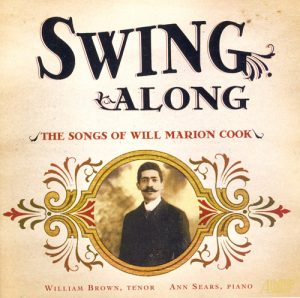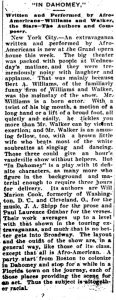In Dahomey, a musical comedy with music written by Will Marion Cook, was a landmark in the development of early 20th-century musical entertainment created and performed by African Americans. In fact, it was the first full-length black musical performed inside a Broadway theatre.1
Cook was a well-educated musician not only in popular song, but also in the classical realm. His skills as a classical performer stemmed out his studies at Oberlin College Conservatory, in Berlin under Joachim, and at the National Conservatory in New York.2 Nevertheless, Cook struggled to be accepted as a serious classical composer and performer because of racial prejudices in the field in the early 1900s.3
“The terrible difficulty that composers of my race have to deal with, is the refusal of American people to accept serious things from us.”4
In Dahomey did not start out in a Broadway theatre; however, audiences of the first performances received it with great enjoyment. In this article from the Cleveland Gazette, great credit for the show’s success and trajectory toward Broadway is pointed toward the main stars of the show Bert Williams and George Walker.5 Both actors were African American ex-vaudeville performers who excelled in the realm of comedy.6 Cook was firm in his opposition towards minstrelsy and black face performance and held true to African Americans being played by African American actors.7
The significance of In Dahomey to our class is the incorporation of black folk elements that have risen in our discussions around the components of spirituals, blues, and jazz. What Cook did so brilliantly was draw from black folk songs while rejecting the exaggerated and stereotyped imagery of minstrel show songs.8 Such elements include syncopation, vernacular language, and even the inclusion of the cake walk.

“Swing Along: The Songs of Will Marion Cook” William Brown and Ann Sears, Will Marion Cook, In Dahomey: Swing Along, Naxos Music Library, 4:53, 2006.
“Swing Along” is a song our textbook pointed to as being demonstrative of the inclusion of black folk components. I have included a recording here where the listener can hear syncopation used to jump the end of the phrase into the next. Crawford attests that Cook uses such syncopation to relate back to coon song of black folk culture.9 In this recording made in 2006, William Brown sings with a boisterous tone that carries the intention of a musical comedy true to the musical itself. The setting with piano accompaniment and solo singer shows that Cook’s music was indeed part of the popular genre because such editions were published for performance by all people.
It seems pretty easy to get excited about In Dahomey and its success as the first in New York to be performed African Americans. However, it is also striking that Will Marion Cook, a key contributor to this success, was led to writing for popular song because he was kept away from his true aspiration and talents in classical music. This creates a tension that we as historians must be cognizant of. That is, we have to realize that while this musical was a step forward for black Broadway theatre, it is also linked to a demonstration of racial prejudice and social discrimination in the field of classical music.
2 Thomas Riis, “Cook, Will Marion,” Grove Music Online, Oxford Music Online, Oxford University Press, accessed October 9, 2017.
3 Richard Crawford, America’s Musical Life: A History, (New York: W. W. Norton & Company, 2001), 534.
4 Marva Carter, Swing Along: The Musical life of Will Marion Cook (Oxford University Press, Dec 2008), 61.
5 “”In Dahomey,” Written and Performed by Afro-Americans,” Cleveland Gazette (Cleveland, OH), Nov. 11, 1902.
6 “In Dahomey,” Encyclopedia of Popular Music, 4th ex., Oxford Music Online, Oxford University Press, accessed October 9, 2017.
7 Richard Crawford, America’s Musical Life: A History, (New York: W. W. Norton & Company, 2001), 534.
8 Thomas Riis, “Cook, Will Marion,” Grove Music Online, Oxford Music Online, Oxford University Press, accessed October 9, 2017.
9 Richard Crawford, America’s Musical Life: A History, (New York: W. W. Norton & Company, 2001), 535.

